
THE VOICE OF INTERNATIONAL LITHUANIA
|
VilNews has its own Google archive! Type a word in the above search box to find any article.
You can also follow us on Facebook. We have two different pages. Click to open and join.
|
Author Archive
The likelihood of Putin invading Lithuania
- Posted by - (0) Comment
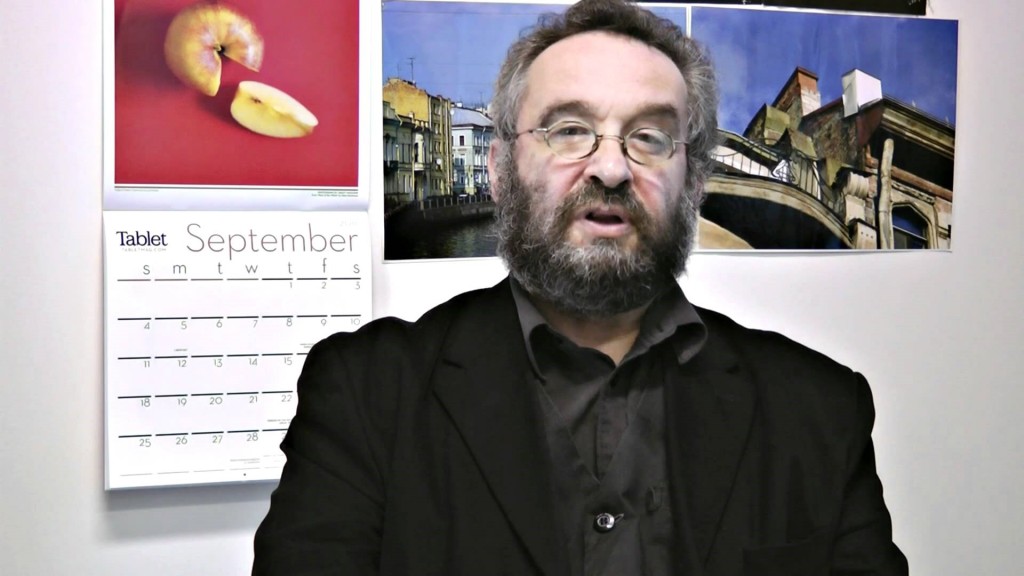
By Mikhail Iossel
Professor of English at Concordia University, Canada
Founding Director at Summer Literary Seminars
The likelihood of Putin’s invading Lithuania or fomenting a Donbass-style counterfeit pro-Russian uprising there, at this point, in my strong opinion, is no higher than that of his attacking Portugal, say, or Ecuador. Regardless of whether he might or might not, in principle, be interested in the insane idea of expanding Russia’s geographic boundaries to those of the former USSR (and I for one do not believe that has ever been his goal), he knows this would be entirely unfeasible, both in near- and long-term historical perspective, for a variety of reasons. It is not going to happen. There will be no restoration of the Soviet Union as a geopolitical entity.
In tacit recognition of that immutable fact, the word combination “the Russian world,” which Putin had brought into political existence ever so triumphantly back in the Spring of 2014, in the immediate wake of the Crimea annexation, has been taken out of circulation completely quite months ago, along with any mentions of the mythological “Novorossiya” (the eight large administrative areas of South-Central and South-Eastern Ukraine which — again, according to the glowing, fever-minded post-Crimean Putin — supposedly, as per some unverifiable historical sources, used to belong to pre-historic, pre-Russian Russia thousands of years ago).
Putin finds himself at this point in a terrible bind of his own making. The simple truth of the matter is this: Russia’s economy is in a shambles, and in a free-fall. Its decline started at least three years ago, prior to Putin’s escapades on the international arena, and subsequently was further exacerbated to a great degree by the drastic slump in oil prices and, of course, the imposition of the Western sanctions against Russia (and, in a remarkable development of breathtaking inanity, along the lines of cutting off one’s nose to spite one’s face, Russia’s reflexive imposition of “food” sanctions against… itself). Simply put, Putin just cannot afford any more large-scale military ventures abroad, if only on purely fiscal grounds. Additionally, he knows now he wouldn’t be able to get away with anything minimally extracurricular there anymore. Having failed to blackmail the West into submissive torpor by indicating his supposed willingness to use Russia’s tactical nuclear weapons in Europe — in effect, attempting to call the West’s bluff thusly: “In Russia, we don’t value our own lives as much as you do, the enfeebled westerns. Well, America and Germany and all the rest of you westerners, are you sure you’d be willing to sacrifice the lives of your young men and women in uniform for the sake of Daugavpils, say, or Narva or Klaipeda?” — he knows full-well now, even based on the immediate subsequent deployment of the US tactical and airforce detachments in the former Soviet Baltic republics, that yes, indeed, NATO most certainly will abide unwaveringly by its charter on common defence, chapter and verse, and will perceive an attack on any one of its members as an aggression against every one of them at once. Putin’s attempt at intimidating the West, thus, ended up in the form of an egg on his own face. And he knows now, too, and only too well, that the West will not hesitate to impose the further, considerably more stringent still, sanctions against his regime, in the case of any slightest display of aggressiveness on his part in Ukraine, let alone anyplace else in Europe. Russia’s economy will not be able to withstand any amount of further punishment, no matter how minute. Such previously discussed steps as, for instance, banning Russian financial institutions from using the SWIFT interbank payment system, would quite literally bring down to its knees the country’s entire financial system.
It is, then, for a combination of above-state reasons that Putin has been hamstrung in South-Eastern Ukraine, forced to freeze the active phase of the conflict here, initiate the removal of Russian troops from the former battle zone, “disown” (or in their view, betray) the local pro-Russian separatists he himself had created and trained and armed to the teeth; and hence, his, ever more insistent efforts to force Ukraine into “taking back” that, thoroughly and pointlessly devastated, war-ravaged region of defunct coal mines and pauperized, angry and confused populace.
It is important to understand that Putin has suffered a devastating, humiliating defeat in Ukraine. None of his overarching original goals for tat endeavour have been achieved. There will be no mythical “Novorossiya,” and therefore no land corridor to the annexed Crimea, which is cut off from Russia geographically and, representing a sort of metaphorical piece of luggage without a handle, already is suffering dramatic price increases and conspicuous rise in the levels of corruption. There will be no wholesale destruction of Ukraine as a form of punishment for her having rejected the corrupt, criminal, authoritarian, dead-end ways of Putin’s fascist regime in Russia. Ukraine is drifting away from Russia, moving decisively in the European direction; and despite the massive current difficulties of economic and structural nature, it will be fine in the end, it will be all right, it will survive, because the western world is on her side, and it will help to pull her through the current hardship. Russia, on the other hand, is getting progressively weaker, having enmeshed itself in a hopeless new “cold war” with the West. Putin’s vanity, his burning desire to be perceived as an equal to the western leaders (and first and foremost among them, the US President) and, impossibly enough, to have the clock of history turned back to the Yalta and Potsdam agreements era, with the world divided between the US and Russian spheres of influence — they have gotten the best of him. There is not a single conceivable scenario whereby Russia could come out the winner in this present confrontation with the West, whose economy collectively is 15 or 20 times stronger than that of Russia, and whose combined military power is vastly superior to Russia’s, as well.
What is Putin to do? His overriding goal in life, at this point, it appears, is to end up dying in his own bed. And since Putin has been proclaimed by his propagandists synonymous with Russia, in terms of his physical and spiritual existence, the above goal has also become Russia’s ultimate strategic goal, for now. He has lost in Ukraine, but he cannot admit that fact publicly. The one hundred million-strong army of Russian TV-viewers, having been subject over the past year to the most extraordinarily intense and toxic media propaganda campaign in human history, continues to be in a highly chauvinistic, belligerent, beclouded state of mind. It wants to keep being assured that Russia is kicking the West’s butt everywhere in the world. Putin, thus, needs to have his populace’s attention switched away from the failure of his Ukrainian campaign, as well as from the catastrophic state of the country’s economy (food prices rising exponentially from week to week, inflation going through the roof, people’s incomes shrinking faster that the portrait of Dorian Grey at its fastest, and millions of people falling into extreme poverty over the last year alone). Enter Syria — Russia’s last ally in the Middle East. Enter the show of Russia’s reclaiming its lost status of a global superpower: “We’re back in the Middle East! The West can no longer keep ignoring us! We’re a superpower again!” It is a virtual war, largely, one made for TV: with no Russian boots on the ground and the Russian planes bombing away at will at random targets, with no perceptible results. Now it’s Syria around the clock on Russian TV-screens — and barely a peep about Ukraine.
It is not difficult to predict the way this latest, Syrian campaign is going to turn out for Putin. Virtual wars have progressively shorter shelf lives in modern world. And then what? Then there will be something else — but already inside Russia, where the new, weaker edition of Stalin-era terror is already being introduced. Putin is desperate. What we are witnessing now is his political agony.
- Bookmark :
- Digg
- del.icio.us
- Stumbleupon
- Redit it
Are all Lithuanian energy problems now resolved?
- Posted by - (6) Comment

By Dr. Stasys Backaitis,
P.E., CSMP, SAE Fellow Member of Central and Eastern European Coalition, Washington, D.C., USA
Lithuania’s Energy Timeline – from total dependence to independence
Lithuania as a country does not have significant energy resources. Energy consuming infrastructure after WWII was small and totally supported by energy imports from Russia.
First nuclear reactor begins power generation at Ignalina in 1983, the second reactor in 1987. Ignalina generates enough electricity to cover Lithuania’s needs and about 50%.for export..As,
The Klaipėda Sea terminal begins Russia’s oil export operations in 1959 and imports in 1994.
Mazeikiu Nafta (current ORLEAN Lietuva) begins operation of
Russia supplies oil to the refinery via Druzhba pipeline since 1980. Stops delivery in 2006.
Lithuania builds
Upon joining EU in 2004, Lithuania is seeking independence from Russia energy sources. Up to 2014, Lithuania imports all gas and most oil and electricity needs from Russia.
In 2014, Lithuania completes construction of LNG terminal at Klaipeda and begins LNG import
In 2018/9, Lithuania and Poland plan to complete pipeline connection for LNG transmission.
By
In late 2016, a 1000 MW electric powerline (LITPOL-Link) will connect Lithuania with Poland.
LNG and electricity interconnections with EU assures energy independence from Russia.
LNG and electricity imports allow energy sharing with Latvia and Estonia.
Some typical relevant picture montage:
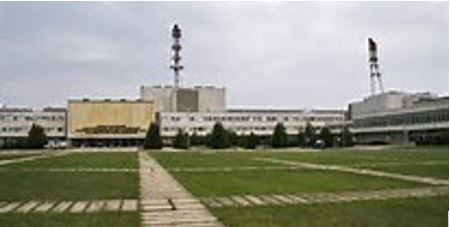
Ignalina – closed nuclear power plant in 2009
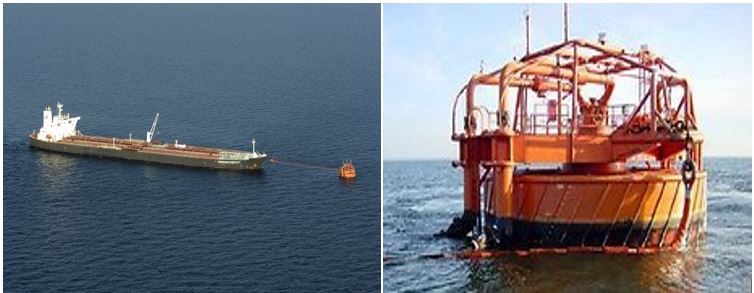
Oil transfer station in the Baltic sea at Butinge Oil transfer receptacle
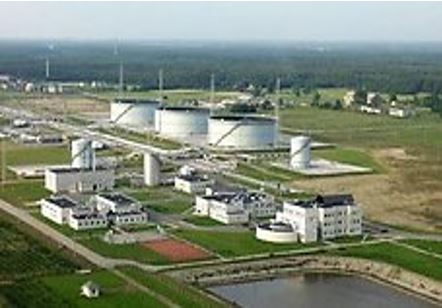
Oil Storage station at Butinge

Oil Refinery – Mazeikiu Nafta (Orlean Lietuva)
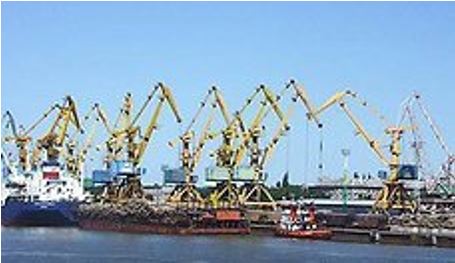
Klaipeda – ship to shore oil transfer terminal
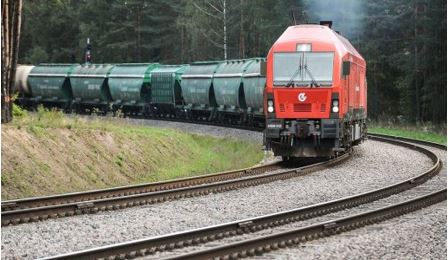
Oil transport from Klaipeda Nafta to Belarus
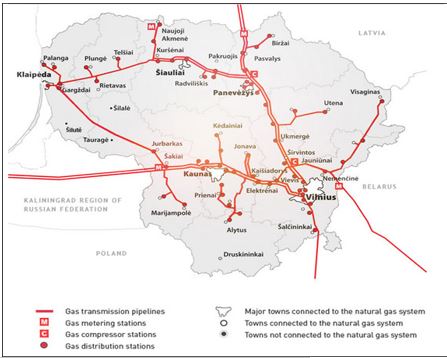
Current gas pipeline network in Lithuania
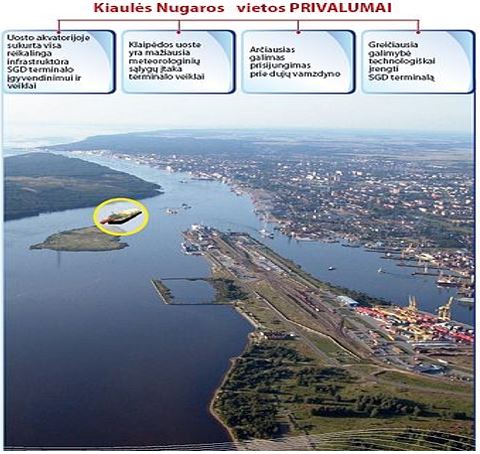
LNG island terminal (yellow circle) just east of inlet to port of Klaipeda
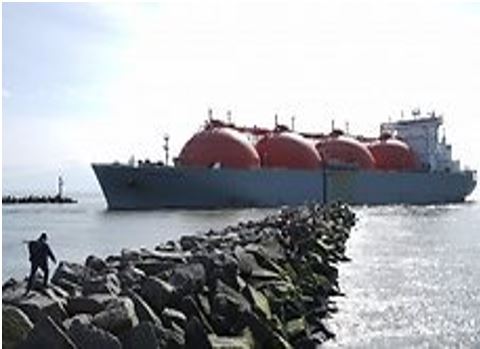
LNG carrying tanker entering the port of Klaipeda inlet
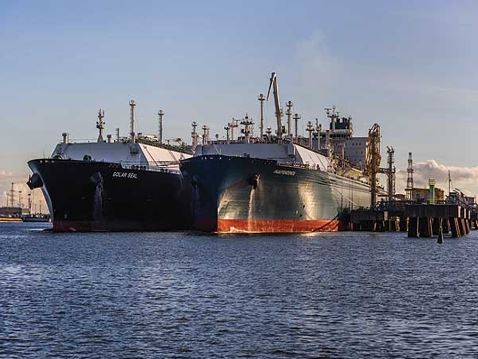
LNG is transferred from tanker to a stationary floating terminal
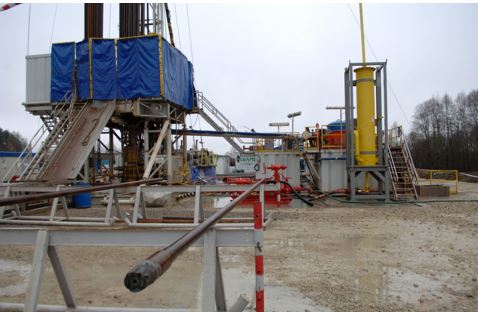
Preparing a 500 mln cu.m. underground LNG
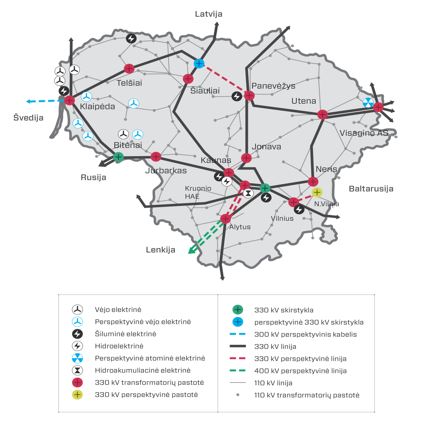
Locations of Lithuania’s electricity producers and the distribution grid
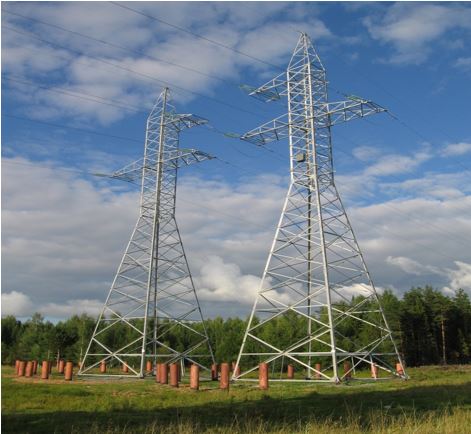
High voltage transmission line towers
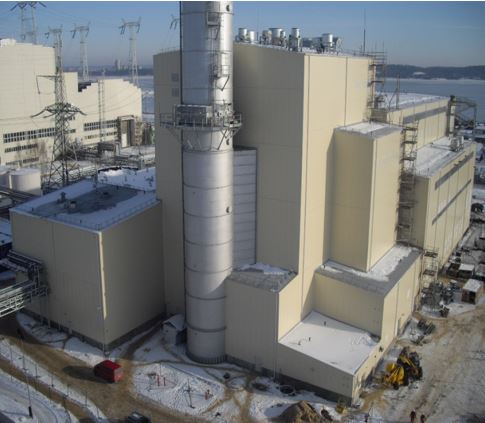
Elektrenai, Lithuania’s main electrical power plant, Four gas and/or oil powered blocks 300 MW/ea., one 455 MW combined cycle block
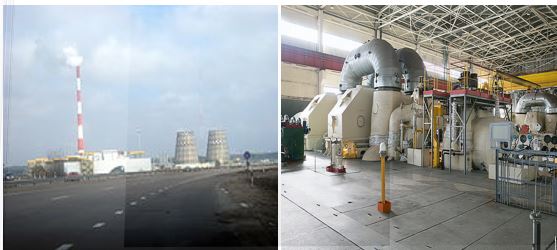
Vilnius Energy – combined heat (603 MW) and electric (360MW) power plant
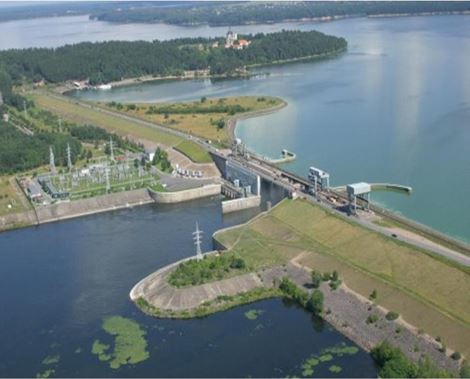
Kaunas hydroelectric 110MW power plant
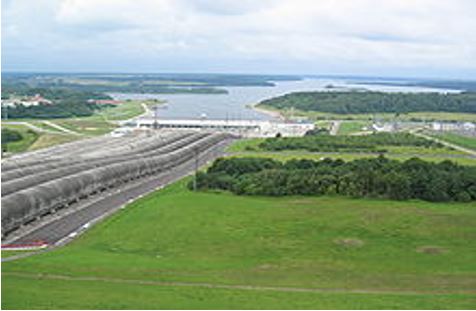
Kruonis Pumped Storage Hydroelectric 900MW powerplant
Lithuania’s current wind power generation in 17 parks - 282 MW
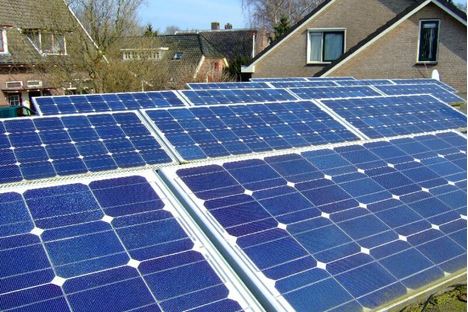
Solar Energy Generating Systems delivered in 2013 61 MW of electric power
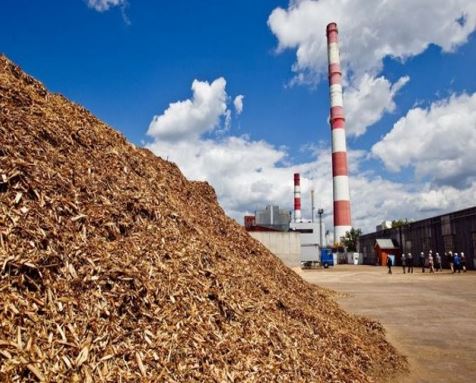
Heat and electricity generation with biofuels and biomass produced nearly 23% of Lithuania’s consumed energy. It is still rapidly expanding
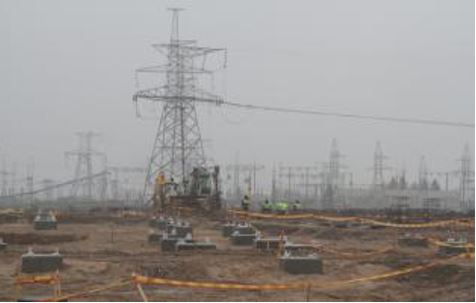
Electrical „LitPol Link” in rapid construction in Lithuania and Poland
- Bookmark :
- Digg
- del.icio.us
- Stumbleupon
- Redit it
Have Lithuanian ties across the Baltic Sea become stronger in recent years?
- Posted by - (0) Comment

By Eitvydas Bajarūnas
Lithuanian Ambassador to Sweden
My answer to affirmative “yes”. Yes, Lithuanian ties across the Baltic Sea become as never before solid in recent years. For me the biggest achievement of Lithuania in the Baltic Sea region during recent years is boosting Baltic and Nordic ties. And not because of mere accident – Nordic direction was Lithuania’s strategic choice.
The two decades that have passed since regaining Lithuania‘s independence can be described as a “building boom”. From the wreckage of a captive Soviet republic, a generation of Lithuanians have built a modern European state, and are now helping construct a Nordic-Baltic community replete with institutions intended to promote political coordination and foster a trans-Baltic regional identity. Indeed, a “Nordic-Baltic community” – I will explain later in my text the meaning of this catch-phrase.
Since the restoration of Lithuania’s independence 25 years ago, we have continuously felt a strong support from Nordic countries. Nordics in particular were among the countries supporting Lithuania’s and Baltic States’ striving towards independence. Take example of Iceland, country which recognized Lithuania in February of 1991, well in advance of other countries. Yet another example – Swedish Ambassador was the first ambassador accredited to Lithuania in 1991. The other countries followed suit. When we restored our statehood, Nordic Countries became champions in promoting Baltic integration into Euro-Atlantic institutions. To large degree thanks Nordic Countries, massive transformations occurred in Lithuania since then, Lithuania became fully-fledged member of the EU and NATO, and we joined the Eurozone on 1 January 2015.
Lithuania took advantage of it very successfully because we soon realized that the assistance and support of the Nordic Countries could help us to play more a significant role in the European and transatlantic space as well as help us solve problems that were urgent for us and the entire region. Nordics, especially – Sweden, became the largest investors in Lithuania, not to mention their financial support for our states’ civil societies, democracy and other important processes which were particularly important to us as developing states that had restored their independence and statehood. And this is quite natural: Nordic and Baltic are united by common values, interests and clear goals. We cherish our freedom but we also care a great deal about everyone’s right to be free.
Several public opinion polls pointed out that Lithuanians believe Lithuania should be associated with the region of Northern Europe, and not with Eastern Europe. Northern orientation dominated in the cases of Estonia and Latvia as well. Orientation towards the North was even proposed by a foreign company that consulted the Government of Lithuania some years ago on image creation issues: in terms of economy Lithuania had rather be associated with the stable, advanced, socially responsible Nordic Countries than the post-soviet space.
- Bookmark :
- Digg
- del.icio.us
- Stumbleupon
- Redit it
- Posted by - (7) Comment
As long as VilNews exists,
|
DR. IRENA VEISAITE, CHAIRWOMAN OF THE VILNEWS HONORARY COUNCIL
|
Professor Irena Veisaite, Chairwoman of our Honorary Council, has asked us to convey her heartfelt greetings to the other Council Members and to all readers of VilNews.
“My love and best wishes to all. As long as VilNews exists, there is hope for the future,” she writes. Irena Veisaite means very much for our publication, and we do hereby thank her for the support and wise commitment she always shows. You can read our interview with her HERE. |
- Bookmark :
- Digg
- del.icio.us
- Stumbleupon
- Redit it
- Posted by - (7) Comment
VilNews is back!
Our publication VilNews has been inactive over the past two years. But here we are again, ready with a fresh new issue. We wish old and new readers worldwide warmly welcome!
VilNews is no normal media, more a communication platform where our readers are invited to give feedback and also write comment articles. I hope you all will enjoy reading/seeing the material we will be publishing!
“New” VilNews consists of 18 sections that you can immerse yourself into by clicking on the link buttons at the top of each page.
If “old” VilNews had been printed on paper, it would become a book of more than 7,000 pages of totally unique reading material about historical and contemporary Lithuania. This huge material is still available. All old and new articles are sorted by topics, in our 18 sections.
I wish you some good reading, and please do not hesitate to contact us!
Aage Myhre
Editor-in-Chief
aage.myhre@VilNews.com
- Bookmark :
- Digg
- del.icio.us
- Stumbleupon
- Redit it
- Posted by - (0) Comment
Writer Yves Plasseraud: My book about Irena Veisaite
Her intelligence and
strength struck me
I have known Irena some 25 years ago within the frame of her Soros Foundation activities, but it was only a few years ago that I began thinking about writing her biography. At the beginning, with Irena our conversations were more or less technical, about Human Rights, minorities, Jewish issues and Lithuanian Jewish relations, in which we were both involved.
The intelligence and the strength of her convictions rapidly struck me.
- Bookmark :
- Digg
- del.icio.us
- Stumbleupon
- Redit it
Three Lithuanias
- Posted by - (0) Comment
|
|
|
|
|
|
By Kestutis Eidukonis
In my travels and musings about Lithuania and Lithuanians it has become quite clear to me that there is no such entity as a single Lithuania anymore. Any serious writing or treatment of the subject matter has to recognize this reality.
The singular Lithuania my parents knew and described to me no longer exists. Lithuania has been transformed into at least three different and distinct entities. Each with its own good and bad characteristics. When I discuss Lithuania with friends and relatives it is like the blind men describing the elephant. Depending on who you talk to. Lithuania is either beautiful, hopeful or beyond redemption.
- Bookmark :
- Digg
- del.icio.us
- Stumbleupon
- Redit it
Three Lithuanias
- Posted by - (10) Comment
|
|
|
|
|
|
By Kestutis Eidukonis
In my travels and musings about Lithuania and Lithuanians it has become quite clear to me that there is no such entity as a single Lithuania anymore. Any serious writing or treatment of the subject matter has to recognize this reality.
The singular Lithuania my parents knew and described to me no longer exists. Lithuania has been transformed into at least three different and distinct entities. Each with its own good and bad characteristics. When I discuss Lithuania with friends and relatives it is like the blind men describing the elephant. Depending on who you talk to. Lithuania is either beautiful, hopeful or beyond redemption.
Last week I my wife Siga, and a mutual friend from Japan, Sakae Wade were privileged to get a tour of the Palace of the Dukes of Lithuania (Valdovū Rūmai). Over the years we have watched as this palace was reconstructed amid controversies and supposed scandal. A lot of Lithuanian media was very critical of the expense, delay and fraud and corruption associated with the Palace. One could not turn on the TV without hearing negative comments about this undertaking. I am ashamed to admit, even I, was taken in by some of this "agitprop". The Palace will open to the public in a few days and I believe visitors will be pleasantly surprised by the beauty and history that will confront them. After taking the tour I was no longer surprised by the amount spent on the Palace.

Had it been a simple question of re-creating the Palace a la Disneyland, I don't think it would have cost the amount of money it did. Fortunately for the posterity of Lithuania, the past as much as possible, was preserved along with the re-creation. The Palace rests on the original foundations and mirrors them as much as possible. The preservation of the original must have cost a fortune. The basement chambers are all climate controlled to preserve the original foundations and other fragile findings. I strongly advise every tourist to Lithuania to deeply explore this marvel. The work done to preserve the original archeology has been praised by experts from all over the world. Yes a lot of things could have been done cheaper - but I think the results were worth it. I and Siga were very much touched by the passionate words of the Deputy Director of the Palace, Dr. Jolanta Karpavičienė, who challenged anyone who wanted to spit on this work and on Lithuanian history to come and take the tour and then if they still wanted to do so to go ahead! I was very impressed by the passion of all the people associated with not only the Palace, but the entire staff who worked in State Cultural Reserve of Vilnius Castles. A lot of very dedicated people fighting very hard to preserve Lithuanians heritage with limited funds and lots of political strings.
The Palace to me symbolizes Vilnius. Vilnius is one of the Lithuanias, it is a charming city seething with prosperity, renovation, construction, pride and liberal doses of corruption and politics. The amount of money being lavished on this city is phenomenal. Tourists in the thousands flock to the Old Town every day! It is truly one of the most architecturally beautiful and unique cities of the world. Vilnius truly is an international city. As one meanders through its winding cobblestone streets one hears a cacophony of languages. Spanish, Italian, German, Russian, Polish, Yiddish, English and many others being spoken. I feel very good and comfortable when I come back to this city. All of Vilnius is not this nice. There are indeed many Soviet style apartments and areas that indeed are a little bit depressing. I have been told that Kaunas is just as nice and more Lithuanian than international, but that is another story. I think Kaunas is more like Vilnius than the rest of Lithuania.
The rest of Lithuania is symbolized by the area where my mother-in-law lives. She lives in a beautiful area of Lithuania that happens to contain the highest point in Lithuania. There farmers are eking out a living. The area is reachable only by turning off of the highway and following first a rock paved road, then a dirt road. First to the town of Stakliškės where Midus is made, than to the farming village of Užuguostis, and finally turning of the rock road onto a dirt road passable by only one car. The wooden carved sign at this point says Gedanonių Kalva, 4.2 km. Arriving at Gedenonių Kalva one is struck by the difficulty of reaching the place, the isolation, the greatness,, and the natural beauty, the wild flowers, the plowed fields and the overgrown fields surrounding the place. One is also struck by how abandoned and overgrown this recently constructed land mark has become. Over a hundred thousand Euros were spent on this "Landmark". The already bad road was further ruined by the construction and a very bad winter, along with improperly done maintenance. I have only seen tourists there once. They did not have much good to say about this monument. The rumor among most of the inhabitants is that this was simply a money-laundering proposition to obtain money from the EU.
The area is administered by a district administrator who has her hands full. The population is declining. From about 3000 inhabitants during Soviet times to about 500, nowadays. She still has to plow the roads, keep culverts clean handle local disputes and other headaches. Half of the population works hard, the other half hardly works. They get by on 350 LT a month unemployment. When one lives in the countryside, getting food and firewood is not a problem. Most people grow their own or a relative grows something and shares it for helping out in the fields. Some people still live in dirt floor homes, others are a bit more prosperous, The only bill some people have to pay is for electricity. This leaves quite a bit left for moonshine and contraband cigarettes. People do odd jobs for some of the more prosperous people in the area, but for the most part it is very difficult to find help or to get people to work. The feeling most of the people have here is that they are not a part of Lithuania. The politicians only look after Vilnius and each other. The EU is looked upon as a waster of money, and a creator of lazy people, who figure out to milk the system. The feeling one gets when one visits this area is that the abandonment will only accelerate. There are already quite a few abandoned farmhouses, where people don't come or only visit occasionally. The contrasts could not be more stunning - beautiful nature - abandoned farms. This area is such a contrast to Vilnius. Some people might prefer this to living in Vilnius. I hope they do make the move. I am sure there are a lot of opportunities for people who want to tame the countryside.
I know for a fact that there are a lot of Lithuanias like this out there. But here in some of these villages I sometimes find the Lithuania of my parents - the people who take care of each other. While some of these people long for the bygone Soviet era - most are patriotic Lithuanians who happen to be totally disenchanted by their government and their representatives and the promises that were made to them. Gedanonių Kalva symbolizes the Lithuanian Government to these people.
The third Lithuania is the diaspora - what a story that is. If the diaspora ever decides to return then Lithuania will be an unbeatable and unstoppable country. I know all the arguments for why they should have stayed in Lithuania. I also know the reasons most of them left. It is truly a desperate step to voluntarily exile oneself from the land of your birth, the land of your friends and relatives. What kind of person does this. Well, let me tell you that most of the people of the Lithuanian diaspora I have met truly only did it as a last resort. I do not think leaving Lithuania was a first choice for any of them. The thing that amazes me the most is that most of these third wavers still love Lithuania, even after all the agonizing things Lithuania has put them through, they still talk and dream of someday returning to a different Lithuania one that doesn't say to them you left - don't come back. You are no longer one of us. I remember a conversation with a Lowlander (Żemaitis) who told me, "Kestuti, you don't understand - they (the people in government) do not want dual citizenship - they do not want you and other Lithuanians who grew up elsewhere. They are afraid that a lot of you will vote. They are afraid that a lot of you will run for office. They are afraid of losing their power base. After all over a third of Lithuania is the diaspora, just think of what this diaspora could do if they all retained or got their citizenship. What if they all voted? It would change the political dynamic of this country. That is why the politicians will never let it happen!"
I believe my friend had a point. If I were sitting in Russia, I could not have devised a better strategy to insure Three Lithuanias! Divided between rural, city and diaspora. A Lithuania I can easily dominate with my oil money! Where my agents will be leaders. Where corruption of the legal system is allowed to flourish. Where people do not trust their government. Where crooks and embezzler's rights are more important than the ordinary Lithuanian's desire to maintain his citizenship and his links to Lithuania. Where is the Leadership of Lithuania? Where is the person or persons who can unite the country? Ah but that is why we have three Lithuanias, a dozen parties - more emigration, more loss of economic freedom. Divide and conquer! E Unum Pluribus!
PICTURES FROM THE ROYAL PALACE:




LITHUANIAN COUNTRYSIDE:

Arriving at Gedenonių Kalva one is struck by the difficulty of reaching the place, the isolation, the greatness,, and the natural beauty, the wild flowers, the plowed fields and the overgrown fields surrounding the place. One is also struck by how abandoned and overgrown this recently constructed land mark has become. Over a hundred thousand Euros were spent on this "Landmark". The already bad road was further ruined by the construction and a very bad winter, along with improperly done maintenance. I have only seen tourists there once. They did not have much good to say about this monument. The rumor among most of the inhabitants is that this was simply a money-laundering proposition to obtain money from the EU.
LITHUANIA’S DIASPORA:

Faces of the Lithuanian diaspora.
Photo; Justinas Bartkevicius.

Faces of the Lithuanian diaspora.
Photo; Justinas Bartkevicius.
- Bookmark :
- Digg
- del.icio.us
- Stumbleupon
- Redit it
- Posted by - (0) Comment
The beggar woman
of Kaunas
 By Boris Vytautas Bakunas
By Boris Vytautas Bakunas
It was bitterly cold in Kaunas that December of 2003 during my first visit to the land of my ancestors. Driven by gusts of bone-chilling wind, I sought warmth inside a delicatessen just off Laisves Aleja.
The old woman stood so close to the door that I nearly crashed into her. Snow swirled in behind me like a white cape, sending its flakes towards the last-minute Christmas shoppers inside. Several cast glances at me, and seeing nothing unusual, turned away.
I could barely hear the muttering, hushed tones the old woman spoke...She was so small that I had to bend my head to see her. A frayed white headscarf tightly hugged a wrinkled face – a face battered by at least 70 years of hard living.
Her lips were moving in cadence with her head, which bobbed up and down ever so slightly as if she were saying her rosary. But there were no beads in the cupped hands that stretched towards me. It was then that I understood she was begging.
I had seen beggars before. I remember one legless beggar sitting in child’s little red, steel wagon in front of a dime store in Chicago’s Bridgeport neighborhood where my family moved just as soon as my grandfather found work in the steel mills. No matter how poor we were, my mother always found a quarter to give him, and he always greeted her gleefully when he saw her coming his way.
I fumbled through my pockets finding only a few litai. The old woman took them. Then she humbly clasped my hands in hers. Her hands were old and gnarled like the roots of an ancient oak clutching the earth.
“Dekuj, dekuj,” she muttered, her head bowing in gratitude. “For what?" I wondered. “A few litai?”
A wave of anxiety swept through me. You know that sinking feeling which calls up a memory flash so brief that you forget the details, and all you are left with is cold dread.
- Bookmark :
- Digg
- del.icio.us
- Stumbleupon
- Redit it
- Posted by - (13) Comment
The beggar woman
of Kaunas
 By Boris Vytautas Bakunas
By Boris Vytautas Bakunas
It was bitterly cold in Kaunas that December of 2003 during my first visit to the land of my ancestors. Driven by gusts of bone-chilling wind, I sought warmth inside a delicatessen just off Laisves Aleja.
The old woman stood so close to the door that I nearly crashed into her. Snow swirled in behind me like a white cape, sending its flakes towards the last-minute Christmas shoppers inside. Several cast glances at me, and seeing nothing unusual, turned away.
I could barely hear the muttering, hushed tones the old woman spoke...She was so small that I had to bend my head to see her. A frayed white headscarf tightly hugged a wrinkled face – a face battered by at least 70 years of hard living.
Her lips were moving in cadence with her head, which bobbed up and down ever so slightly as if she were saying her rosary. But there were no beads in the cupped hands that stretched towards me. It was then that I understood she was begging.
I had seen beggars before. I remember one legless beggar sitting in child’s little red, steel wagon in front of a dime store in Chicago’s Bridgeport neighborhood where my family moved just as soon as my grandfather found work in the steel mills. No matter how poor we were, my mother always found a quarter to give him, and he always greeted her gleefully when he saw her coming his way.
I fumbled through my pockets finding only a few litai. The old woman took them. Then she humbly clasped my hands in hers. Her hands were old and gnarled like the roots of an ancient oak clutching the earth.
“Dekuj, dekuj,” she muttered, her head bowing in gratitude. “For what?" I wondered. “A few litai?”
A wave of anxiety swept through me. You know that sinking feeling which calls up a memory flash so brief that you forget the details, and all you are left with is cold dread.
I feverishly searched my pockets again. Empty.
“Wait here,” I said. “Don’t move. I’ll be right back.
I skidded across the icy street to a bankomat and got – I don’t know how much – maybe sixty dollars worth of litai.
Then I rushed back. Would the old woman still be there when I got back?
I shoved a crumpled ball of paper money into her hands. As she began unwrapping it, I tried to leave. But a hand tore into my sleeve. All I remember were the tears running in rivulets down her wrinkled face and the words “Dekuj, dekuj” and something about how she and her daughter who was ill would have heat this month and could celebrate a real Christmas.
“Ner už ką,” I blubbered. “It’s nothing, nothing really.”
The living room of my cousins’ apartment was decked with a feast you’d expect to find on a luxury liner. Though far from rich, they had spared no expense to greet their relative from abroad. My aged aunt, the youngest sister of my dead father, marveled that I had not forgotten my native tongue. Toast followed toast. Laughter rung out like the sound of Christmas bells and chimes.
I laughed, too. But my thoughts were elsewhere. I had come to Lithuania bearing the ashes of my mother, in fulfillment of her wish to be buried in her beloved Kaunas. And now I thought of my last days with her and the gifts she had given me.
The gift of her labor, the seemingly endless of hours of toil she spent working in factories for a pittance during our first decade in America.
The gift of her words, the words she spoke to me just before I started school, telling me that if I worked hard one day I would work in an office or maybe even be a teacher myself..
And I remember her gift of compassion. No matter what our circumstances, she always managed to have something left over to give to others -- a donation to a charity, a Sunday offering to the Church, and always a quarter to every beggar she saw.
I have seen beggars wherever I’ve been. I have seen lame beggars, beggars without legs, beggars with bent backs. I’ve seen young beggars barely out of their teen-aged years, their arms pitted with scabs and their hands swollen from drugs. I’ve seen healthy, strong beggars. And beggars who smelled a saloon.
I have heard people say, “Don’t give him a cent. He’s healthy. He’s strong. Why doesn’t he find a job and work like the rest of us?”
“He’ll just waste it all on drink.”
And I remember my mother’s words, “How sad it is that the only joy some men can find in life comes in a bottle.”
And now I remember the old woman with the frayed white headscarf in Kaunas during the winter of 2003 muttering “Dekuj, dekuj” and weeping, and I remember thinking of her sick daughter. Did they have their real Christmas in a warm apartment that year? I hope so. Was it their last Christmas? I hope not. Oh God, I hope not.
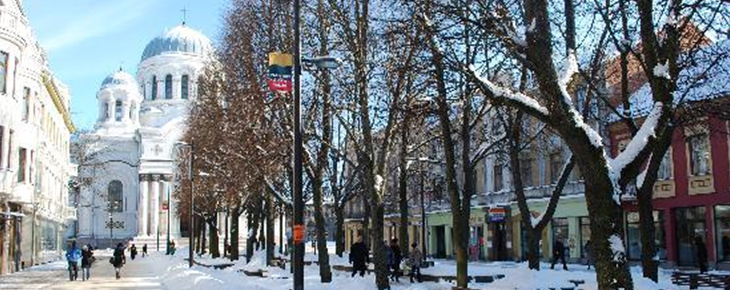
- Bookmark :
- Digg
- del.icio.us
- Stumbleupon
- Redit it
- Posted by - (3) Comment
Baltics path to euro in
a sea of Eurozone turmoil
 Dr. Stasys Backaitis |
Lithuania will hold the Presidency of the Council of the European Union in the second half of 2013, starting from the 1st of July. VilNews has on this background asked readers to annotate and analyze factors that have to do with Europe, the EU, the euro and Lithuania. This is one of the posts we have received. An article by Dr. Stasys Backaitis, |
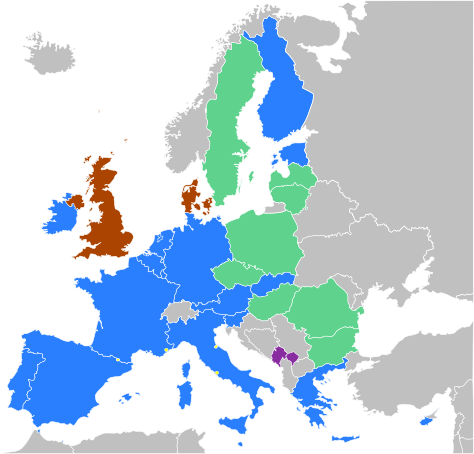
|
EU Eurozone (17) |
The promise
For most of the southern EU countries the euro may seem like chains to a captive, but for Latvia’s and Lithuania’s governments and their elites, acceptance into the eurozone (EZ) symbolizes freedom and independence. To the Baltics, membership in the EZ reinforces each country's integration into the west and is the final big step in liberation from their historical tormentor, Russia. Following Latvia, Lithuania is eagerly awaiting the green light to be admitted to the EZ in the next year or two. That was also the message by the Nobel Committee last year, when it awarded the EU the Nobel Peace Prize for its role in “the advancement of peace and reconciliation, democracy and human rights as well as political freedom”. The message echoed by the Continent’s politicians, in the words of German Chancellor Angela Merkel, is the choice between continued integration or a return to “centuries of hatred and blood spill”.

The EU message is hammered home relentlessly by the EU
politicians,
who believe their citizens face a stark choice, in the words
of Chancellor
Angela Merkel of Germany, between continued integration and a
return
to “centuries of hatred and blood spill.”
Benefits of membership
This euphoria seems to be rather a strange contradiction, as deep financial problems in Greece, Portugal, Spain, and several other countries have rattled the foundations of EU and particularly the integrity of the eurozone. Now that the Czech Republic, Poland as well as Hungary are having second thoughts of joining the euroclub, and England is outright rejecting the thought, why are the Baltic countries so eager to join it?
Lithuanian Finance Minister, Rimantas Sadzius, echoed Dombrovski, by saying in a Bloomberg Brussels interview on May 13, 2013 that joining the euro will help his country’s economy by boosting its ability to attract international financing. “We would have a huge improvement of the investment climate in Lithuania almost overnight,” Sadzius said. He noted that “Lithuania risks isolation if it slows its march to the common currency, now that Finland and Estonia have joined the 17-nation euro bloc and Latvia has been invited to join it in 2014.” Assuming it can meet all economic and fiscal targets, Lithuania is aiming for acceptance into the eurozone in 2015. “We want to participate in the decision-making of the euro zone,” Sadzius said. “We see our future here.”
According to the Guardian, Latvia's prime minister, Valdis Dombrovskis,” joining the euro makes economic sense”. It will bring budget savings, promote foreign direct investment and underpin the recovery from an economic collapse in 2008-11. But it's not all finance and economics. For the Baltic States, long at the mercy of an imperial Russia, whether tsarist or communist, and now wary of Vladimir Putin, the euro would affirm gain rather than loss of sovereignty.
The Baltic States wanted to join the eurozone in 2008, but was stopped by the financial collapse in the EU. Their housing and consumption bubble, fuelled by cheap credit from the Swedish and Danish banks that dominate the Baltic banking sector, burst and sent the economy into a tailspin, more in Latvia and Lithuania and somewhat less in Estonia. Their economies shrank by nearly 25%, civil service jobs and wages were slashed, numerous social, education, and health services frozen and some axed. As a result unemployment tripled, property prices collapsed by up to 70%, and an estimated 10% of the population, mainly young people, emigrated.
Yet in the last year and a half, the Baltic countries went back from bust to boom. Because of their previous belt tightening economic policies and self imposed fiscal constraints, they became the fastest growing in the entire EU region, up to 5% last year.
Dombrovskis and his Lithuanian counterparts argue that, unlike Greece and the other southern rim eurozone members, the recovery of their countries is solid and sustainable, based on manufacturing and exports and not by easy credit of the boom years of the last decade. The achievements are something no other eurozone members have managed to pull off, by imposing austerity measures and spending cuts as tough or tougher than any in the eurozone without causing public unrest or social upheavals.
|
Lithuanian Finance Minister, Rimantas Sadzius, said in a Bloomberg Brussels interview on May 13, 2013 that joining the euro will help Lithuania’s economy by boosting its ability to attract international financing. “We would have a huge improvement of the investment climate in Lithuania almost overnight,” Sadzius said. He noted that “Lithuania risks isolation if it slows its march to the common currency, now that Finland and Estonia have joined the 17-nation euro bloc and Latvia has been invited to join it in 2014.” |
|
Managing hazards
Are the Baltic States over the hump, and will not experience the euro sickness that is shaking the southern EU rim? Based particularly on Greece’s and Portugal’s debilitating experience, there is convincing evidence that euro’s initial lure leads most financially unendowed, less industrialized and poor in natural resources countries, subsequently to very painful downfall.
Estonia’s Prime Minister Andrus Ansip noted at the Baltic Development Forum in Riga on May 30, 2013 that Latvia and Lithuania’s joining the euro area will make the Baltic States even more attractive to investors and will boost economic growth in the region. “Joining the euro area was and is very important to us. After joining the euro area, foreign investment in Estonia went up 10.4% within a year while unemployment decreased significantly”. According to the Prime Minister, the use of a common currency also increases trade with other European Union member states and generates economic growth.
In a 1961 paper Robert Mundell noted that common currency is a matter of balancing advantages against disadvantages. Economically, the advantages are reductions in the costs of trade-eliminating the need to buy and sell currencies, to hedge exchange rate risks with futures or swaps, and the like. Economic disadvantages stem from the fact that a country with a shared currency cannot respond independently to external shocks by using monetary instruments like changes in interest rates or exchange rates. Mundell also recognized a role for political factors in the choice of currency arrangements. Interestingly, at that time, he saw the question of common currency as purely academic, “hardly within the realm of political feasibility that national currencies would ever be abandoned in favor of any other arrangement.” Little did he know of what would happen in 2000 and beyond years.
If joining the eurozone stimulates economies and helps to reduce unemployment, why is the opposite happening to the southern rim of EU?* People in the southern rim countries appear to believe that the euro project has locked them in economic chains, rather than advancing democracy, liberalism, and human rights. As is, the euro has taken the weaker less industrialized member states to an extraordinary test of resilience. Large segments of the southern EZ citizens see themselves cast in an economic prison, with Germany as the jailer and the common currency as the bars. They view the future as continued stagnation, characterized by aging societies with expensive welfare burdens and large segments of the young people sitting idle and , unable to find work.. It is a horrendous stress, unseen in the history of modern Europe, and particularly devastating to the youth segment. Of the population. In the Continent’s sick-man economies, the jobless rate for those under 25 now staggers the imagination: more than 40 percent in Italy, more than 50 percent in Spain, and more than 60 percent in Greece.

If
joining the eurozone stimulates economies and helps to reduce
unemployment,
why is the opposite happening to the southern rim of EU?
Stepping stones to success
Upon joining the eurozone, countries such as Greece, Spain, Italy, and Portugal are almost certainly no better off than if they would have kept their own currencies a decade ago. "The introduction of the euro created a lot of wrong signals and distortions," says Uri Dadush, an economist at the Carnegie Endowment in Washington, DC and author of the excellent new study “Paradigm Lost, The Euro in Crisis”. The euro provided benefits, such as reduced transactions costs, inexpensive loans to finance internal projects, etc., but also caused very serious problems at pay-back time these countries now face."
Monetary union has damaged their economies in two major ways. First, inexpensive borrowing, that made the euro look so appealing, caused booms in domestic consumption. However, it also raised enormously overall costs, especially for labor. As a consequence it lowered dramatically their competitiveness both compared to stronger euro zone members such as Germany and France and with respect to countries that didn't join the euro like Britain and Sweden.
Second, the easy credit enticed the southern rim governments to borrow and spend lavishly. As a result, they are now struggling with potentially ruinous levels of debt. Both problems were just what Friedman would have predicted, that, a single monetary policy and one-size-fits-all interest rates simply won't work for economies as different as mighty Germany and as wobbling as Greece or Spain. It turned to be ruinous even to the more prosperous Italy and Ireland, whose stronger economies suffered from the same wrong signals.
Since joining the eurozone, the southern EU economies have lost ground to their stronger trading partners in competitiveness. Their costs for making products or even growing fruits and vegetables, especially for export, have increased sharply and became uncompetitive The best measure, called Real Effective Exchange Rate or REER index, calculated by the EEC for 35 nations, indicates that the main culprit in the unbalance is the cost of labor.
Since 1989, the competitiveness ratings fell 9% for Greece, 16% for Spain and Italy, and 26% for Ireland, which was renowned as a mighty exporter. Now, everyone of them is struggling with costs that are between 16% to 31% above the norm. According to the index, labor and other expenses in Italy and Spain are now one-third higher than in the UK. This indeed is not a good denominator for resolving high unemployment problems.
Latvia’s and Lithuania’s integration into Europe must be viewed through the lens of powerful historical forces and very dangerous and unpredictable neighbors. For both countries deeper integration into the EU is the only right way to go. But the euro evidently might not be necessarily the right symbol of that forward movement, or if it is, it must be handled with extreme sense of balance, which in a climate of intense political rivalry is very difficult to carry out. The euro is most often viewed as a political project, one that will bring the nations of Europe into a greater and deeper union. But joining the euro at a moment when history is fiercely contesting this vision, might be euphoria to some and disaster to others. The majority of Baltic populations is on the cautious side and wants to see first how the EZ will resolve its own problems. Will politicians listen?
Although Latvia and Lithuania appear to meet the criteria set by EU to be admitted to the eurozone club, it does not tell the whole story. Membership in the eurozone may not always be easy, because each of the countries faces unique problems and because the euro itself is in a highly fragile circumstance.
First; it is not likely that inflation in both Latvia and Lithuania will continue to stay as low as it is now. Experience by southern rim euro countries indicates that a relatively poor country with a fixed exchange rate, upon availability of “cheap” money, will experience faster inflation than its larger trading partners. Yet to counteract these negative effects, the euro member countries cannot use monetary policies and exchange rates to manage their changing inflation rates.
Second; faster real growth and faster inflation will make management of fiscal policy more difficult. During the boom years of cheap and easy money in 2004 to 2007, the governments, yielding to populist pressures, raised government salaries, minimum wages, and social benefits with little worry about consequences. The resulting overheating of the economies intensified the crash that followed the global economic crisis in 2008 and 2009. As a result, even more severe austerity measures were required than would otherwise be needed. To avoid repetition of that scenario careful fiscal management is an absolute necessity.
Third, both Latvia and Lithuania face a difficult demographic situation. The population reproduction rates in the last decade are well below replacement levels, accompanied by steadily increasing number of retirees per worker. The rising burden to support pensions, increasing healthcare needs of the aging population, and lack of employment opportunity induced emigration of large numbers of mostly young people. As a consequence, falling revenues, increasing outlays, and high unemployment made the financial situation very difficult to control.

Since
joining the eurozone, the southern EU economies have lost ground to their
stronger trading partners in competitiveness. Their costs for making products
or even growing fruits and vegetables, especially for export, have increased
sharply and became uncompetitive The best measure, called Real Effective
Exchange Rate or REER index, calculated by the EEC for 35 nations, indicates
that the main culprit in the unbalance is the cost of labor. Since 1989, the
competitiveness ratings fell 9% for Greece, 16% for Spain and Italy, and 26%
for Ireland, which was renowned as a mighty exporter. Now, everyone of them is
struggling with costs that are between 16%
to 31% above the norm. According to the index, labor and other expenses in
Italy and Spain
are now one-third higher than in the UK.
The bottom line
The governments of Lithuania and Latvia appear to realize that they are dealing with a very fragile economic and geopolitical situation, but in their judgment, the quest for insuring security and protection of their countries’ sovereignty are worth many sacrifices and hardships. In their many speeches, the respective politicians suggest that success in dealing with the 2008-2012 world economic crisis is a living proof that the austerity measures taken were sufficient to navigate safely through extremely devastating situations, and that the recipes of the European Commission do work and helped to achieve the planned results.
If becoming eurozone members is a way for the Baltic countries to insure security and protection of their sovereignty, then it is a reasonable risk, provided it is guarded by good governance and sound administration of fiscal policies. Of most importance is that the Baltic politicians do not succumb to the lures of easy money and irresponsible spending. Even when debt is incurred, the borrowed funds should be invested in long-term economic growth and job creation, improved competitiveness, quality of work, and with focus of achieving positive balance of trade. The Baltic politicians need to realize that their small countries are not equipped and cannot compete in traditional mass manufacturing with highly industrialized countries. Rather the countries can excel by being frugal and competing through product uniqueness, excellence in quality, innovation and unexcelled services. Their success of rising from economic ashes of 2008-2012 is a proof of their ability to meet these challenges.

- Bookmark :
- Digg
- del.icio.us
- Stumbleupon
- Redit it
- Posted by - (0) Comment
Baltics path to euro in
a sea of Eurozone turmoil
 Dr. Stasys Backaitis |
Lithuania will hold the Presidency of the Council of the European Union in the second half of 2013, starting from the 1st of July. VilNews has on this background asked readers to annotate and analyze factors that have to do with Europe, the EU, the euro and Lithuania. This is one of the posts we have received. An article by Dr. Stasys Backaitis, |

|
EU Eurozone (17) |
If becoming eurozone members is a way for the Baltic countries to insure security and protection of their sovereignty, then it is a reasonable risk, provided it is guarded by good governance and sound administration of fiscal policies. Of most importance is that the Baltic politicians do not succumb to the lures of easy money and irresponsible spending. Even when debt is incurred, the borrowed funds should be invested in long-term economic growth and job creation, improved competitiveness, quality of work, and with focus of achieving positive balance of trade. The Baltic politicians need to realize that their small countries are not equipped and cannot compete in traditional mass manufacturing with highly industrialized countries. Rather the countries can excel by being frugal and competing through product uniqueness, excellence in quality, innovation and unexcelled services. Their success of rising from economic ashes of 2008-2012 is a proof of their ability to meet these challenges.
- Bookmark :
- Digg
- del.icio.us
- Stumbleupon
- Redit it
- Posted by - (0) Comment
What’s wrong with Europe
and how to fix it?
 Valdas Samonis |
Lithuania will hold the Presidency of the Council of the European Union in the second half of 2013, starting from the 1st of July. VilNews has on this background asked readers to annotate and analyze factors that have to do with Europe, the EU, the euro and Lithuania. This is one of the posts we have received. An article by Valdas Samonis, PhD, CPC |
Cutting through the EU bureaucratic gobbledygook
Part 2

The more I am into my research on my forthcoming book
"INSIDER CRONY SOCIALISM", the more I see the parallels
between the Gorbachev's USSR and Barroso's EU!
Collapsing EUSSR under Reformer Barrosov?
Pray that God gives more wisdom to European Leaders!
I have to admit it.
The more I am into my research on my forthcoming book "INSIDER CRONY SOCIALISM", the more I see the parallels between the Gorbachev's USSR and Barroso's EU!
- Bookmark :
- Digg
- del.icio.us
- Stumbleupon
- Redit it
- Posted by - (1) Comment

Vilnius authorities
ban upcoming
Baltic Pride march
Vilnius municipal authorities ban the upcoming Baltic Pride march, even if Lithuania’s Supreme Administrative Court this week confirmed a ruling from the First Instance Court, stating that the Vilnius municipality was in breach of domestic law on peaceful assemblies by denying the possibility for the march to take place in the city centre.
Last January, Vilnius municipal authorities said the march could not be held along the Gediminas Avenue, in the centre of the city, claiming it would force shops and hotels to shut down due to security concerns, and, instead, proposed a secluded location along the banks of the Neris River.
Municipal authorities also claim the proposed route is too close to judicial and governmental buildings, raising national security concerns. However, in the past, demonstrations have been allowed on the same avenue.
“The decision to ban the Baltic Pride march on security grounds is disproportionate, given that the Vilnius authorities refused to engage in constructive discussions with the Lithuania Gay League, despite rulings by domestic Courts’ saying that negotiations had to be re-opened,” said John Dalhuisen, Europe and Central Asia Director at Amnesty International.
Amnesty International has launched a petition calling on Lithuanian authorities to ensure the event takes place according to the organizers’ plans and that adequate protection is provided.
The Vilnius municipal authorities sought to block the first Baltic Pride in Vilnius in 2010, but the event ultimately went ahead following a court-ruling.
“It is frankly amazing that three years after the first Baltic Pride in Vilnius, we are back in exactly the same situation as before, with the City authorities openly refusing to respect the freedom of assembly of Pride participants and seemingly prepared to ignore administrative court rulings.”
Comments
Arunas Teiserskis The problem here is social conservatism, which has nothing to do with nationhood or freedom. Discrimination of gays was just recently widely accepted by lots of societies in the world and even enshrined in many religions (and still is). So changing this attitude won't be easy and will definitely not be done by means of directives "from above". Take note, that Lithuanian people were liberated from Soviet ideology, which they tried to replace either by Western liberalism or the same Western mainly Christian conservatism. And both proponents of those conflicting ideologies are accusing each other of being Soviet-style, what doesn't help to discuss in calm fashion. And by virtue of being anti-Soviet even neo-Nazis are deemed by social conservatives as less appalling than the open gayness. This problem exists in the West as well (especially taking into account recent decision of Supreme Court in the US, because if there were no problems with than, there would have been no need of Supreme Court involvement), so this is just another case of worldwide problem in separate country - which should be confronted, of course. Though one didn't talk about the whole US and its all population acting in backward and primitive fashion, when the DOMA was voted in. So please reserve your criticism for the conservative part of Lithuanian society, not the whole country. Especially when the Lithuanian court already ruled out that Vilnius Municipality's policies towards the parade broke the already existing Lithuanian laws.
Mary Ann Albee Bigotry in any form is still spelled the same.
Ricardas Cepas If somebody decided to be Napoleon or Czar they have medical atention. If sobebody decides to be Gay, their rights are protected. Thats not fair towards Napoleons or Czars;)
Arunas Teiserskis Ricardai, AFAIK, rights of "Napoleons and Czars" in modern society are to be equally protected as well of all other people, no matter what you decide or born to be. You should check your (total lack of) knowledge on legal matters in this field, if you think it is lawful in Lithuania to discriminate against people with mental disorder (not talking about your ethics to mock on this issue in this discussion).
Mary Ann Albee Being gay is not a mental illness nor does it use brutal and deadly force against those who do not march to their drummer.
Timotiejus Sevelis AMEN Sista!
Don't forget, GAYS are environmentally friendly....We don't add new people to the planet!!! LOL
NOW!! get out of my bedroom and let me have fun with my boyfriend!!!
Ricardas Cepas Arunas,
1. My problem is not that you Gay, its your private choice, my problem is, that you promote your private choice to children and people, which did not born Gay and you do it outside of your private life and do that hiding behind core values of human rights. By the way, Nazis use this strategy to come to power back then.
2. You mentioned "modern societies" it usually comes and goes, in my humble opinion, its more fashion of these years, then shift of core values, for some of us fortunatelly for some unfortunatelly. But I agree fashion always was hot topic. Remember Hipies "free love" movements? Where are they today?
So choice of promoting Gays by any means in press, demonstrations and etc., looks like natural survival strategy worldwide and has nothing to do with Human rights.
3. And if you born Gay-be it, dont promote it to children who were not born Gays. Respect their rights similary like I respect your private choice.
Linas Johansonas Ricardas Cepas Gays are born gay. And every gay was a child. What kind of "promotion" are you afraid of for children? You cannot turn a child or adult gay. Just like you didn't choose to be straight. It happens naturally within us. There is nothing wrong with teaching children that there are gay people in the world. It's a part of life.
and yes Ricardai, gay rights have to do with human rights.
Ricardas Cepas Linas Johansonas, Children are addicts to any advertising and they tent to try stuff when its promoted everywhere so hard.
Arunas Teiserskis Ricardai, I'm not gay, I'm very straight, married and have children. Meanwhile you're obviously dumb. Because you don't realize, that one in no possible means can "advertise" any straight person into being gay. And vice versa. It's not drugs and neither it is fashion. Go and educate yourself a bit, before pretending being smart.
Linas Johansonas Ricardas Cepas: no one is promoting gay sex to them. For example, the gay march is about gay rights, not sex. yes, some teenagers do experiment with gay sex just like they experiment with straight sex & you know what, thats how some find out whether they are straight or gay. Teenagers having sex is going to happen without any promotion. It's a fact of life. Thats why you have to have sex education for teens. As for young children, they aren't developed enoiugh to be interested in any sex.
Wyman Brent I am straight and married and my wife and I will soon have our first child. We do not believe that knowing gay people exists will turn our child gay. He may be born gay but it will have nothing to do with the knowledge that others are gay. That would be like saying all gay people will become straight because they know that most people are straight.
- Bookmark :
- Digg
- del.icio.us
- Stumbleupon
- Redit it
- Posted by - (0) Comment
NEWSLETTER
A New Vytautas Kasiulis Art Museum is Open

The Vytautas Kasiulis Art Museum is a new unit of the Lithuanian Art Museum, open to public from 28 of June. Vytautas Kasiulis has fully deserved to be called by art reviewers as one of the most interested painters of Paris school of the second half of 20th century.
Read more
Culture Night –
“Let There Be Night!”

Vilnius Old Town
2013-07-05
Music jingling all night long from the abandoned backyard in Vilnius old town, never-ending movie show in the meadow at the Baltasis Bridge, concerts, performances, exhibitions, workshops, and installations taking place on the streets, squares, and the most unexpected spaces... The entire city is filled with music, colors, lights, and smiles. And this is not a dream or a motive from a motion-picture. All this is the Culture Night.
Programme
New Self-Serve Bike Rental System in Vilnius
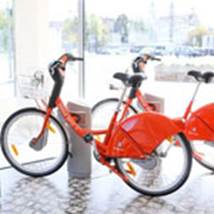
Starting July 15th, bikes will be available for self-serve rental for Vilnius residents and visitors. At the rental stations, bikes will be available for rent 24 hours a day, 7 days a week. The stations will be distributed at distances of 300-400m from each other. The bike rental season will extend to October 15th.
Read more
Discover Vilnius Old Town
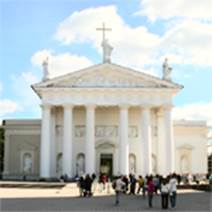
If you came to Vilnius on your own and want to become acquainted with the city, to see its most beautiful sites, we invite you to join the tour Discover Vilnius Old Town. Tours are organised in English, Russian & German languages and start at 11 am from Cathedral Belfry.
Read more
Listen to the
Sounds of Music

Various Places
2013-07-021 – 2013-09-08
This is an international Christopher Summer Festival that abides by the rule “all genres are good except the boring ones”. It is one of the biggest summer events in Vilnius, which attracts numerous performers from Lithuania and other countries. A limitless, happy, eclectic marathon of fun “holiday” concerts is about to begin!
Read more
Days of Live Archaeology
in Kernavė
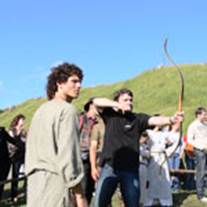
Cultural Reserve of Kernavė
Kerniaus g. 4a, Kernavė
2013-07-06 – 2013-07-07
The past will rise from the oblivion in the ancient capital of Lithuania. Festival of experimental archaeology is dedicated to commemorate the Coronation of Mindaugas – the Statehood Day. During the festival visitors will have a possibility to try various medieval games and funfairs, watch the craftsmen work.
Programme
Tamsta Music Festival
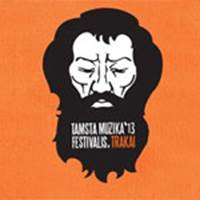
Trakai
2013-07-12 – 2013-07-14
July 12-14 – that's the weekend, when Lithuanians and their friends from all over the World are going to Trakai. Friendly atmosphere, tones of music, love, entertainment, games, beautiful nature and water – this festival is “a must” of this summer.
Programme
Contacts:
Vilnius Tourist Information Centre & Convention Bureau
Vilniaus g. 22 LT-01119 Vilnius
tic@vilnius.lt
- Bookmark :
- Digg
- del.icio.us
- Stumbleupon
- Redit it
- Posted by - (0) Comment
What’s wrong with Europe
and how to fix it?
 Valdas Samonis |
Lithuania will hold the Presidency of the Council of the European Union in the second half of 2013, starting from the 1st of July. VilNews has on this background asked readers to annotate and analyze factors that have to do with Europe, the EU, the euro and Lithuania. This is one of the posts we have received. An article by Valdas Samonis, PhD, CPC |
Cutting through the EU bureaucratic gobbledygook
Part 2

The more I am into my research on my forthcoming book
"INSIDER CRONY SOCIALISM", the more I see the parallels
between the Gorbachev's USSR and Barroso's EU!
Collapsing EUSSR under Reformer Barrosov?
Pray that God gives more wisdom to European Leaders!
I have to admit it.
The more I am into my research on my forthcoming book "INSIDER CRONY SOCIALISM", the more I see the parallels between the Gorbachev's USSR and Barroso's EU!
According to the numbers circulating in the European financial press, the EU outstanding debt is some euro 40 trillion!
The practically only EU paymaster's (Germany') GDP is some euro 2,5 trillion. I will not insult your intelligence; just compare the two!
For the first time in human history, the picture is further dangerously complicated by some one thousand trillion in toxic derivatives sloshing around the global economy. It is like financial AIDS and no bank will tell you that!
In terms of financial intermediation, Europe relies on banks much more than any other major region of the world economy.
On June 26, the EU agreed to a couple of years of reforms towards the European Banking Union (EBU), a very complex bank supervision, etc, arrangement that leaves some countries out, some in, to different and obfuscated extents, etc.
Coming to the Gorby/USSR parallel, when the central planning from Moscow (sorry: Frankfurt/Brussels!) doesn't work, the solution proposed by the planners is more centralized planning rather than letting nations or EU sub-regions to find their own workable solutions.
Germans are wise as usual; they exempted the great majority of their banks (that serve the German economy) from the EBU and will regulate them from Berlin, not Frankfurt (ECB)! Voila!
If I were a young European, I would buy my transatlantic ticket today; one way!
Pray that God gives more wisdom to European Leaders; as the Lithuanian Bishops suggests when the LT Presidency of the EU starts on July 01, 2013.
- Bookmark :
- Digg
- del.icio.us
- Stumbleupon
- Redit it

 Click on the buttons to open and read each of VilNews' 18 sub-sections
Click on the buttons to open and read each of VilNews' 18 sub-sections 




















.jpg)



